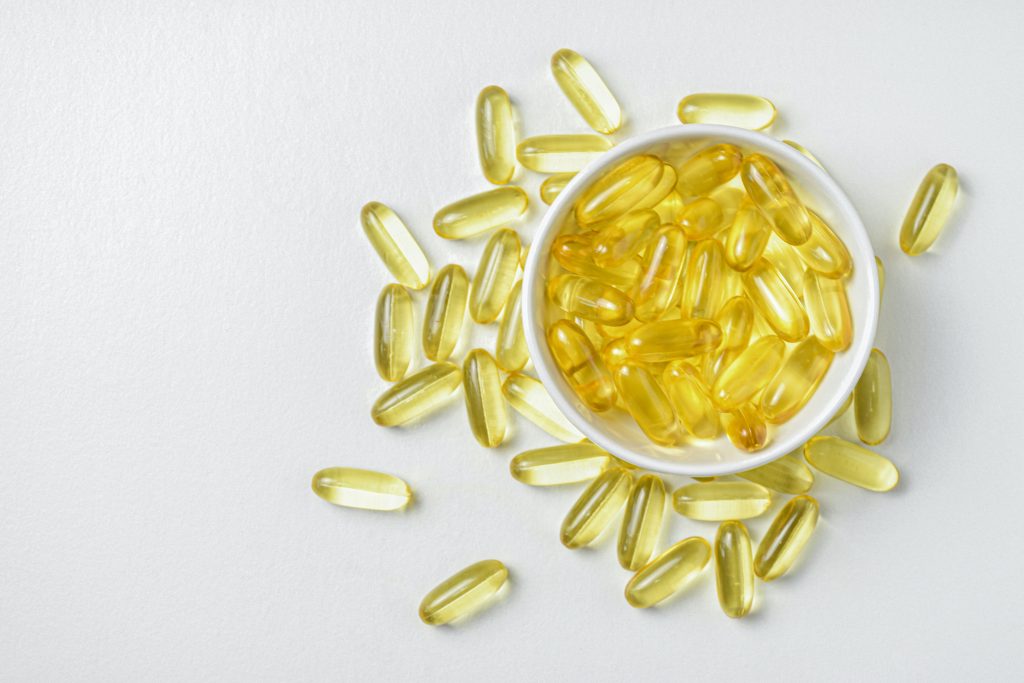Discover the potential benefits of calcium and vitamin D intake in improving spinal health postpartum.
Can Calcium and Vitamin D Intake Improve Spinal Health Postpartum?

Are you a new mom concerned about your spinal health after giving birth? Well, fear no more! Research suggests that increasing your calcium and vitamin D intake can do wonders for your postpartum spine. So let’s dive into the importance of these two nutrients and how they can benefit your spinal health.
Understanding the Importance of Calcium and Vitamin D
Before we get into the nitty-gritty details, let’s take a moment to appreciate the vital roles that calcium and vitamin D play in our bodies.
Calcium and vitamin D are two essential nutrients that work together to support various functions in the body. While calcium is well-known for its role in maintaining strong bones and teeth, it also plays a crucial role in muscle function, nerve transmission, and blood clotting. Think of calcium as the superhero that keeps everything running smoothly inside your body.
During pregnancy and breastfeeding, your body goes through some significant changes. It’s essential to provide your body with an adequate supply of calcium to meet its increased demands. Calcium not only supports the development of your baby’s bones and teeth but also helps maintain your own bone health during this transformative time.
Vitamin D, often called the “sunshine vitamin,” is responsible for helping our bodies absorb calcium. Without enough vitamin D, all that calcium you’re consuming won’t be of much use. Vitamin D acts as a facilitator, ensuring that calcium is properly absorbed and utilized by the body. It also plays a role in supporting immune function and maintaining healthy muscle function.
It’s worth noting that the primary source of vitamin D is sunlight. When your skin is exposed to sunlight, it produces vitamin D naturally. However, factors such as geographic location, time of year, and skin pigmentation can affect how much vitamin D your body produces. So, take advantage of those sunny days to boost your vitamin D levels naturally, but also consider other sources of vitamin D, such as fortified foods and supplements, especially during periods of limited sun exposure.
In conclusion, calcium and vitamin D are a dynamic duo that work together to support various functions in the body. Calcium ensures strong bones and teeth, while vitamin D facilitates the absorption and utilization of calcium. So, make sure to include calcium-rich foods in your diet and get enough sunlight or consider other sources of vitamin D to maintain optimal levels of these essential nutrients.
Postpartum Spinal Health Concerns
Now that we understand the importance of calcium and vitamin D, let’s address some common concerns related to spinal health after childbirth.
After giving birth, your body goes through numerous changes as it adjusts to the postpartum period. While the focus is often on the baby’s health, it’s crucial not to neglect your own well-being, including your spinal health.
Common Spinal Issues After Childbirth
It’s no secret that pregnancy puts a lot of strain on your body, especially your spine. The weight gain, hormonal changes, and shifts in your center of gravity can all contribute to various spinal issues. Many new moms experience back pain, pelvic pain, and postural problems. These discomforts can linger long after birth.
During pregnancy, your abdominal muscles stretch to accommodate the growing baby, which can weaken your core muscles. This weakened core can lead to poor posture and increased stress on your spine. Additionally, the hormone relaxin, which helps prepare your body for childbirth, can also loosen the ligaments in your spine, making it more susceptible to strain and injury.
Don’t worry; you’re not alone. These issues are quite common among new moms. However, it’s essential to take care of your spinal health to avoid long-term complications.
Long-Term Impact of Postpartum Spinal Health
Addressing postpartum spinal health isn’t just about relieving immediate discomfort. It’s also about safeguarding your long-term well-being. Ignoring or neglecting spinal health after childbirth can have significant consequences.
Poor spinal health after childbirth can lead to chronic pain, muscle imbalances, and decreased mobility. The constant strain on your spine can result in herniated discs, sciatica, and other spinal conditions that may require medical intervention. Moreover, the discomfort and limited mobility can affect your ability to care for your newborn and enjoy your journey into motherhood without any unnecessary aches and pains!
Fortunately, there are steps you can take to promote postpartum spinal health. Engaging in gentle exercises that strengthen your core and back muscles can help alleviate pain and improve posture. Practicing good body mechanics, such as lifting with your legs and maintaining proper posture while breastfeeding, can also reduce strain on your spine.
Additionally, seeking professional help from a chiropractor or physical therapist who specializes in postpartum care can provide targeted treatment and guidance to address any specific spinal issues you may be experiencing.
Remember, taking care of your spinal health is not a luxury but a necessity. By prioritizing your well-being, you can ensure that you are physically capable of embracing the joys and challenges of motherhood to the fullest.
The Connection Between Calcium, Vitamin D, and Spinal Health
Now, let’s explore how calcium and vitamin D specifically affect your spinal health postpartum.
During pregnancy, your body goes through numerous changes to support the growth and development of your baby. One of these changes is an increased demand for calcium and vitamin D. These nutrients are essential for the development of your baby’s bones and teeth, but they also play a crucial role in maintaining your own bone health.
How Calcium Affects Spinal Health
As mentioned earlier, calcium plays a crucial role in maintaining strong bones. It is the primary mineral responsible for bone strength and density. By increasing your calcium intake, you can improve bone density and reduce the risk of fractures or osteoporosis.
But how does calcium specifically affect your spinal health? Well, your spine is made up of a series of vertebrae, which are stacked on top of each other. These vertebrae are connected by small joints and cushioned by intervertebral discs. Calcium is essential for the formation and maintenance of these structures.
With a stronger spine, you’ll be better equipped to handle the physical demands of motherhood, from carrying your little one to chasing after them as they start exploring the world. Calcium also plays a role in muscle function, so having adequate levels can help prevent muscle cramps and spasms that may occur during postpartum recovery.
How Vitamin D Affects Spinal Health
Remember our sunshine vitamin, vitamin D? It not only aids in calcium absorption but also plays a role in overall bone health. Vitamin D is unique because it can be synthesized by your body when your skin is exposed to sunlight. However, many factors can affect your ability to produce enough vitamin D, including geographical location, time of year, and skin pigmentation.
Research suggests that vitamin D deficiency is associated with an increased risk of back pain, muscle weakness, and postural imbalances. By ensuring adequate vitamin D levels, you can give your spine the support it needs. Vitamin D helps regulate the absorption and utilization of calcium in your body, ensuring that it is properly incorporated into your bones and teeth.
Additionally, vitamin D has anti-inflammatory properties, which can help reduce inflammation in the joints and muscles of your spine. This can alleviate pain and discomfort, allowing you to move more freely and comfortably.
It’s important to note that while sunlight is a natural source of vitamin D, it may not be sufficient to meet your needs, especially during the postpartum period when your body is undergoing significant changes. Therefore, it’s recommended to speak with your healthcare provider about the appropriate dosage of vitamin D supplements to support your spinal health.
Nutritional Recommendations for Postpartum Women
Now that you understand the benefits of calcium and vitamin D, let’s talk about how to incorporate them into your diet.
During the postpartum period, it is crucial for women to prioritize their nutritional needs to support their recovery and overall well-being. Adequate intake of calcium and vitamin D is particularly important as these nutrients play a vital role in maintaining bone health, supporting immune function, and promoting optimal muscle function.
Daily Calcium and Vitamin D Intake
For postpartum women, the recommended daily intake of calcium is 1,000 milligrams (mg) for those under 50 years old. This amount helps to replenish the calcium stores that may have been depleted during pregnancy and childbirth. Calcium-rich foods are essential for the development and maintenance of strong bones and teeth.
When it comes to vitamin D, aim for 600-800 international units (IU) per day. Vitamin D is crucial for the absorption and utilization of calcium in the body. It also plays a role in regulating mood and supporting the immune system.
Remember to consult with your healthcare provider to ensure these recommendations align with your unique needs. They can provide personalized guidance based on factors such as your overall health, breastfeeding status, and any specific medical conditions you may have.
Incorporating Calcium and Vitamin D in Your Diet
Getting these nutrients doesn’t have to be a chore. Many delicious foods are rich in calcium and vitamin D, making it easier to meet your daily requirements.
Dairy products like milk, cheese, and yogurt are excellent sources of calcium. They provide not only calcium but also other essential nutrients like protein and vitamin B12. If you prefer non-dairy options, try fortified plant-based milks or tofu. These alternatives can provide a similar amount of calcium as dairy products while being suitable for those following a vegan or lactose-free diet.
To boost your vitamin D levels, consider including fatty fish like salmon and mackerel in your diet. These fish are not only rich in vitamin D but also provide omega-3 fatty acids, which have anti-inflammatory properties and support brain health. Eggs are another good source of vitamin D, and they can be easily incorporated into various dishes. Additionally, fortified cereals can be a convenient way to increase your vitamin D intake.
While food sources are important, don’t forget to soak up some natural vitamin D by spending time in the sun. Sunlight is a natural source of vitamin D, and your body can produce it when your skin is exposed to sunlight. Aim for a few minutes of sun exposure on your face, arms, and legs several times a week. However, it’s essential to balance sun exposure with sun protection measures, such as wearing sunscreen and seeking shade, to reduce the risk of skin damage.
In conclusion, incorporating calcium and vitamin D into your postpartum diet is crucial for your overall health and well-being. By including a variety of calcium-rich foods and vitamin D sources in your meals, you can ensure that you are meeting your daily requirements and supporting your body’s needs during this important recovery period.
Potential Benefits of Increased Calcium and Vitamin D Postpartum
So, why go the extra mile with calcium and vitamin D, you might ask? Let’s explore some benefits that may motivate you to prioritize your spinal health postpartum.

Improving Spinal Health
By increasing your calcium and vitamin D intake, you’re giving your spine the support it needs to recover and maintain optimal health. Say goodbye to those nagging back pains and hello to a stronger, more resilient spine.
Other Health Benefits
The benefits of calcium and vitamin D extend beyond just your spine. These nutrients contribute to overall bone health, immune function, and even mood regulation. So, in addition to improving your spinal health, you’ll be promoting your overall well-being.
So, new moms, take charge of your spinal health postpartum! Boosting your calcium and vitamin D intake can make a world of difference, not only in relieving immediate discomfort but also in safeguarding your long-term well-being. Incorporate these nutrients into your diet, soak up some vitamin D from the sun, and enjoy the journey of motherhood with a healthy and happy spine!



